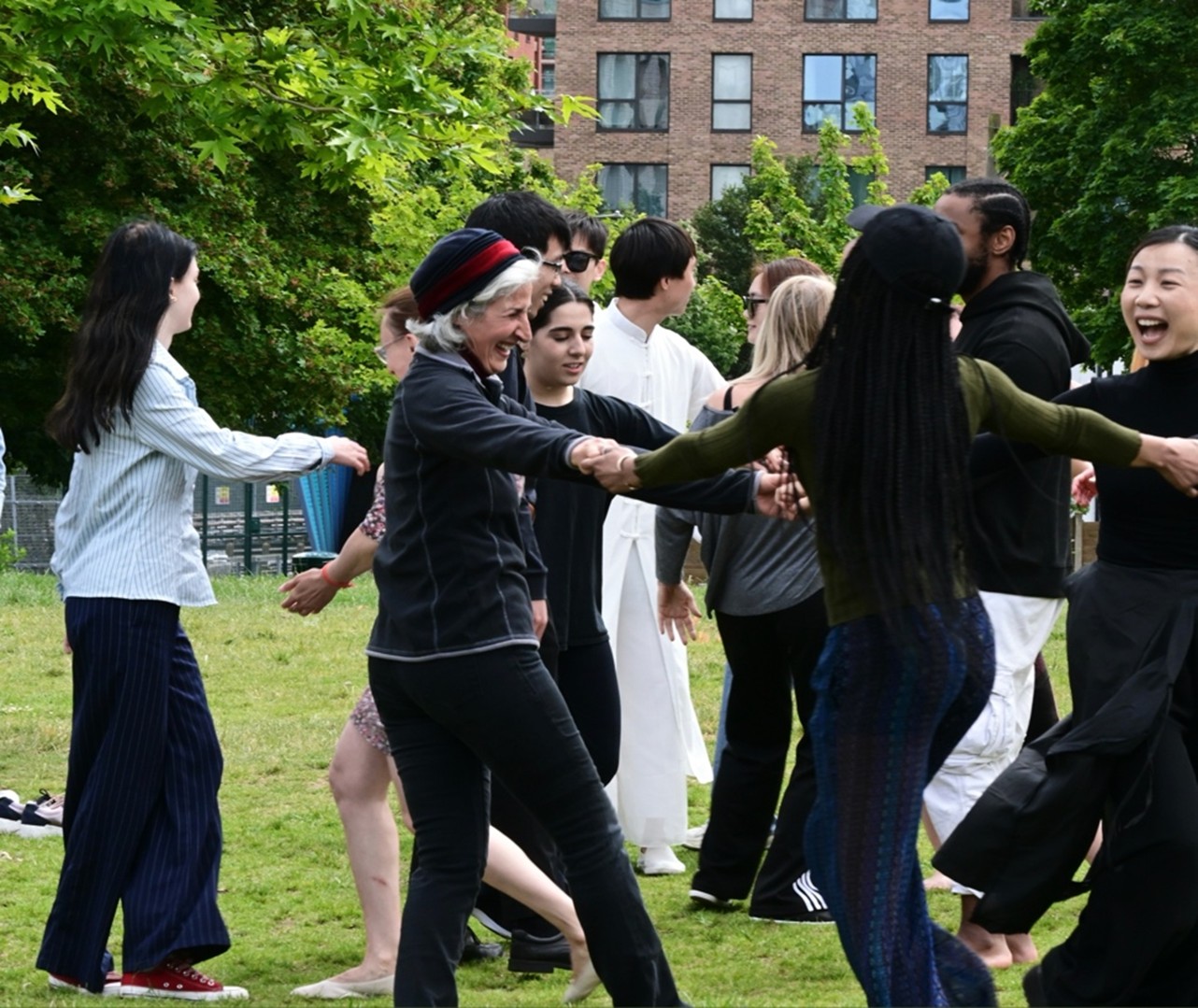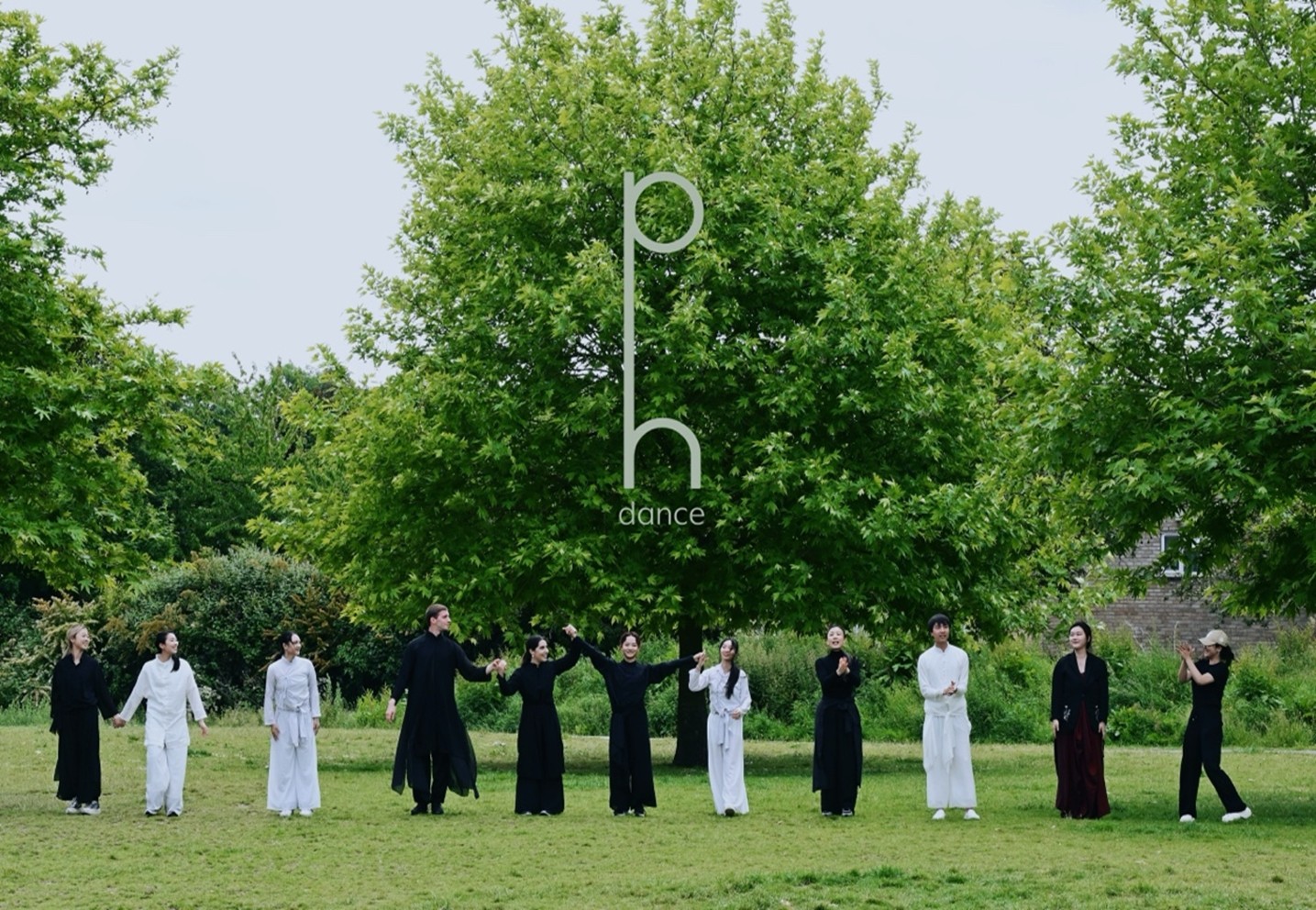PhD students use dance to celebrate human connection
23 September 2025
/5x0:1431x969/prod01/channel_3/media/middlesex-university/news-section-images/2025/Resonant-Space-pic-1.jpg)
Dance project Resonant Spaces shows MDX is at the heart of Barnet cultural life
Three MDX PhD students have set up a community dance company, which staged innovative participatory performances on and off campus during the summer.
Non-profit collective PhDance was formed after Jingwen Lu and Sangdi Zhou met Xuefei (Shaffi) Chu in January, prompted by an idea of Sangdi's for an experimental project fusing Chinese traditional movement with contemporary Western dance.
The group's show Resonant Spaces was performed outdoors in Colindale Park at the start of summer as part of the London Festival of Architecture - an example of the powerful role MDX plays as an anchor for cultural activity in the Borough of Barnet. In the audience were figures in Barnet's charity and creative industries sectors. Further performances took place at MDX's Grove Dance Studio during the summer staff conference later in June.
Dancers for the show were recruited via the students’ networks, chance meetings at MDX or social media. “It was extremely hard to coordinate everyone’s schedules for practice and rehearsal, and some dancers even turned us down because of our non-profit nature,” says Shaffi. Striking monochrome, flowing costumes were purchased online and shipped from China.
Audience members/community participants came on board through an online, email and print promotion campaign; for the first performances the students invited passers-by in Colindale Park to join in.

The show begins with a dance sequence representing rush-hour commutes and daily work routines with rushed and angular movements. Audience members join in for a section using soft, circular Tai Chi gestures and coordinated breathing, before a quiet call for human connection as the dancers make eye contact, touch and hold each other.
Jingwen, who studies community dance for his PhD, says Resonant Space by observations of daily life, such as watching people on the Tube immersed on their phones and not interacting. "We bring Chinese Tai Chi to slow down and bring awareness of yourself and your surroundings," he says.
During the final part of the show Sangdi watches audience members and finds that some touch each other or talk to fellow participants while others are deep in thought. "Good things happen during these performances," she says. "This is another kind of way to awake people, so they are feeling things in themselves". Audiences expressed a lot of appreciation, some even becoming emotional after the shows, the students observe.
Resonant Spaces has a mission to address loneliness and offer an emotional boost. "You can’t always be happy about everything," Shaffi says. “I accept anything that’s not good in my mind, [but] I still have another space I can open to positive things.
"I can heal myself with others. We have powers in our self and our bodies".
Shaffi is an experienced choreographer, performer and teacher who has worked in both China and the UK, leading to her taking up elements of both Eastern and Western movement practice. Sangdi has an interdisciplinary approach to choreography with an interest in improvisation and site-specific work. Jingwen is a lecturer at Hubei University of Education with a background in Chinese folk dance, particularly the traditions of the Tujia people.
Jingwen says he chose MDX because of academics’ Dr Stefanie Sachsenmaier and Emeritus Professor Chris Bannerman's extensive experience teaching Chinese students. MDX’s facilities such as its dance studios, theatre and library were also a huge attraction, he adds. Shaffi says all the academics she has come across are "super-supportive" and that she is grateful for supervisors’ directness and the freedom she feels to speak her mind. Sangdi has found a supportive culture among MDX postgrad research students, within Dance and across other disciplines.
All three students see connections between their academic specialisms and the community engagement they do as PhDance.

Sangdi says she may need to hold workshops for her doctorate on screen dance. Shaffi suggests she could bring her observations of people's unique dance styles into her research: "I can think about how your movement affects how you see a person dancing," she says. Jingwen says he "definitely will continue exploring how to bring dance or traditional movement into people's daily life" when he returns to China.
Supervisor Stefanie Sachsenmaier says “it is of great credit to the students that they so quickly found each other, created a company and began very quickly to integrate in the local dance and community culture”. From a European perspective, she says, it is noteworthy how valued dance is in China, as well as the status that exercises such as Tai Chi Chuan have, and with PhDance the students "have got a really good way to open up the experience of Chinese philosophy and movement to everyone". Emeritus Professor Chris Bannerman notes the impact of exchanges between China and the UK, such as the ArtsCross International Choreography initiative of which he was founding director.
Meanwhile, Psychology lecturer Dr Lucy Irving has been attracting growing crowds and rave reviews for Dance for Joy, the free community dance event she holds on campus every two to three months, in association with the MDX University Healthy Ageing Research and Practice Group. Aimed at the over-55s, this sets out to provide an authentic disco experience with no routines or choreography, just freestyle dancing, taking inspiration from countries such as Japan and South Korea, whose populations continue to participate in dance and movement activities as they grow older with benefits for physical and psychological health.
Professor Kurt Barling, Deputy Dean Research and Knowledge Exchange for the Faculty of Arts and Creative Industries says: “Dance stands as a profound expression of cultural memory, identity, and lived experience. It bridges body and meaning, history and presence. To research dance as practice is to engage with fundamental questions of what it means to know, to feel, and to be".
For more information about PhDance, visit the PhDancehub website.


/0x37:1040x744/prod01/channel_3/media/middlesex-university/news-section-images/Ant-Chrissy-Stephanie_Pride-Awards.jpg)
/8x0:1033x697/prod01/channel_3/media/middlesex-university/news-section-images/2026/Andy-Reed.jpg)
/8x0:1033x697/prod01/channel_3/media/middlesex-university/news-section-images/2025/LSID-LAUNCH-55.jpg)